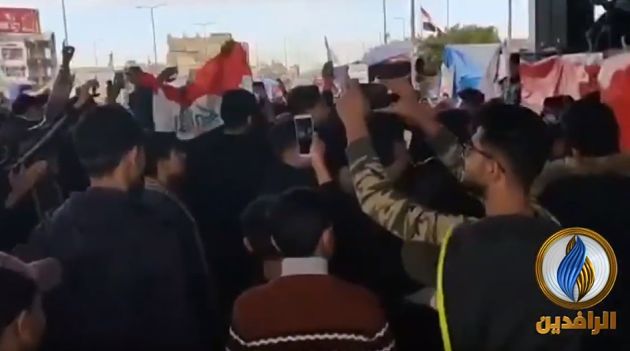The result of the show war between the USA and Iraq, as already mentioned, led to the killing of an Iranian general, and in retaliation about a hundred Iranians were crushed at his funeral, as well as 176 people on board a Ukrainian airliner, most likely shot down by the Iranians. Among them, it should be recalled, 82 were also Iranians.
However, this is not the first time that the Iranian regime has buried its own citizens together with its enemies. A significant part of these events is taking place on the territory of neighboring Iraq, which has turned into a battlefield between the Shiite expansionist Iranian regime and America with its regional allies. Many Iraqis are becoming increasingly disenchanted with this situation. Today, spontaneous demonstrations took place in several cities of the country under the Iraqi national flags with patriotic slogans and the motto «Neither America nor Iran!
An indicator of these sentiments became today’s statement by Muqtada al-Sadr, who called for de-escalation of the conflict with America. After the elimination of Qasem Soleimani by the Americans on Iraqi territory, Sadr, positioning himself as an Iraqi patriot, called for mobilization against the U.S., which is logical in his position. Nevertheless, we must understand that there was no particular reason for Iraqi patriots to mourn the elimination of Soleimani. After all, he was opposing them in Iraq, where anti-regime protests fueled by Iraqi patriotism were growing, with Sadr as one of their leaders. On the other hand, by provoking an escalation with the Americans and their retaliation, Soleimani wanted to divert the attention of the Iraqis to the confrontation with America. He succeeded at the cost of his own life, but as we can see, not for long.
In general, the desire of the Iraqis to stop being a pawn in the American-Iranian games and to bring order to their own country is not only reasonable, but is essentially the only alternative to a large-scale war between the Shiite and the royal-Arab alliances, the inevitability of which is proclaimed by serious analysts. In this context, the slogan «Neither America nor Iran» is perfectly logical for Iraqis who do not want their country to become the battleground of such a war.
However, we must understand that America, as the perpetrator of Iraq’s destruction along with Saddam’s regime, is not particularly interested in any escalation with Iran on its territory. While the Iranian regime considers Iraq, with its Shiite majority, as its satellite, the Americans could easily abandon its existence as a state and recognize the independence of both Iraqi Kurdistan and the Arab Sunni provinces. However, they have done exactly the opposite, providing all possible assistance to the Baghdad government to maintain control over the entire country. It is worth noting that even Sadr was warmly welcomed in Saudi Arabia, despite the fact that he is not only a Shiite, but also the same Shiite leader who, to a certain extent, provoked the escalation of violence between Shiite and Sunni Iraqis against the backdrop of the American invasion and the overthrow of the Saddam regime, which was based on ethnic Sunnis.
In other words, it is precisely America and the neighboring Arab countries that are interested in Iraq as a self-sufficient, non-sectarian Arab state. In this case, the presence of American military bases on its territory would indeed be completely inappropriate, as would any colonial interference in relations between Washington and Baghdad. However, this becomes irrelevant if the vacuum left by the departure of the Americans is attempted to be filled by the Iranian regime, which aims to turn Iraq into its satellite on a sectarian basis. In that case, resistance to this Iranian-Shiite expansion will unfortunately be inevitable, as will the war into which it will eventually escalate.
Whether this happens, or whether Iraqis can unite across sectarian lines and take back their country, depends largely on themselves.

